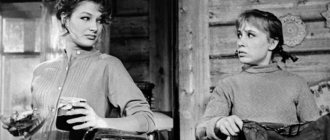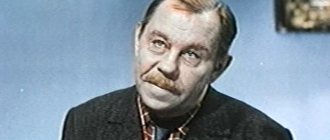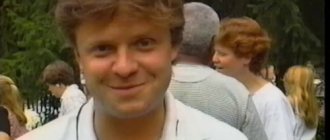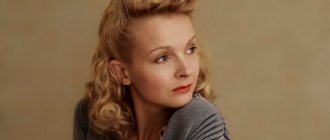Biography
For young journalists, Svetlana Innokentievna Sorokina is the standard of journalistic professionalism and honesty. In 2013, the TV presenter and director was awarded the symbolic 10th level of journalistic rigor. She has a huge number of awards, of which Sorokina calls popular recognition the most valuable.
Journalist Svetlana Sorokina
Svetlana Sorokina (maiden name Sarykova) was born in January 1957 in Pushkin, Leningrad region. The parents of the future journalist were intelligent workers. Dad worked as a military builder, and mom taught history at school. The cult of education reigned in the family. The parents dreamed that their daughter would grow up to be an erudite, intelligent person. And Svetlana tried to live up to these dreams. The girl studied well and graduated from school with a gold medal. The girl decided to get a higher education without leaving her beloved city. She entered the Forestry Academy, choosing landscape architecture.
The habit of doing everything well, no matter what I undertake, was reflected during my studies at the academy. Svetlana Sorokina, as one of the most successful students at the university, was offered to enroll in graduate school.
Svetlana Sorokina
The idea of television journalism came to Svetlana when the girl, like other students, worked as a tour guide. While showing tourists the local attractions, of which there were a great many in Pushkin, Svetlana noticed how attentively the people listened to the young guide. She managed to tell stories in an interesting and informative way. It was probably then that the journalist “woke up” in Sorokina.
Unexpectedly for her loved ones, Svetlana becomes a student in a special broadcasting studio formed at Leningrad Television.
Natalya Belokhvostikova and son Kirill
People's Artist Natalya Belokhvostikova took three-year-old Kirill from an orphanage in 2007. Married to director Vladimir Naumov, the actress has already raised a daughter, Natalya, who also became a film director and actress, but the creative couple has not yet received grandchildren. The couple met Kirill when they arrived at a creative evening at an orphanage - in numerous interviews, the actress said that, unlike other children, he did not ask to be taken home, but simply asked to be given a pectoral cross, which he did not have. Then Natalya and Vladimir went to visit Kiryusha for a year and finally decided to take him into their home. 8 years after his adoption, Kirill is no different from his peers - he is active, loves to play sports, draw, and learns French.
Watch Real Adoption on Monday, September 21st at 9:00 pm on TLC.
Journalism
A year later, Svetlana Sorokina made her debut on television. The girl was hired as a freelancer for the Telecourier analytical program. Another year passed, and in 1987, the existence of a talented journalist was noticed by Alexander Nevzorov. At the personal invitation of Sorokina, she joined Nevzorov’s increasingly popular project “600 Seconds”.
Journalist Svetlana Sorokina
This program, according to Svetlana Innokentyevna, turned out to be a school of journalistic excellence. Here the girl quickly becomes a professional and acquires her own style. Sorokina had to cover crime news, so the girl was constantly at the forefront of events, learning to react quickly and adequately.
Soon Svetlana Sorokina becomes the main TV presenter of “600 Seconds”. The middle generation of Russian viewers remembers this program. When the program went on air, all matters were postponed. The stories and reports of Sorokina and Nevzorov were watched with bated breath.
It’s no wonder that in 1990 Svetlana Sorokina was invited to Moscow. The journalist was entrusted with hosting a program that was considered the symbol of VGTRK - “Vesti”. And the journalist hosted the program masterfully. Few people after Sorokina managed to hold the attention of the audience so brilliantly. It is noteworthy that Svetlana Innokentievna was also the direct creator of the project, developing issues from “A” to “Z”.
Svetlana Sorokina in the Vesti program
Sorokina worked as a presenter and political commentator until 1997. This was the peak of the journalist's popularity. She received the Order for Personal Courage after covering the events of 1993. And a TEFI figurine appeared in Svetlana Sorokina’s piggy bank.
In 1997, the famous television journalist moved to NTV. Here she becomes the author and presenter of the popular and poignant projects “Hero of the Day” and “Voice of the People.” These programs immediately turn into the most rated ones.
During the same period, Svetlana Sorokina made her debut as a documentary director. Her projects, released from 1997 to 2006, are of great interest. For the first time in many years and even decades, the veils of secrecy began to peel away from the authorities. People saw its representatives not as monumental statues, but as ordinary creatures of flesh and blood. Sorokina’s documentary “Yeltsin’s Heart” talked about the operation that Boris Yeltsin underwent. The film “Purely Russian Murder” revealed the motives for the murder of Galina Starovoitova, and the film “The First First Lady” told about the life of Raisa Maksimovna Gorbacheva.
Svetlana Sorokina in the talk show “Basic Instinct”
After the release of Svetlana Sorokina’s projects, her already impressive number of awards doubled. But the sharp criticism of the authorities, which the famous journalist allows herself, does not go unnoticed.
In 2002, Svetlana Sorokina hosted a new author’s program “Nothing Personal,” but after five episodes the show closed. According to fans of the journalist, the experimental format of the program, incomprehensible to television viewers, is to blame: strangers, transparent partitions, a wall-sized screen.
In 2003, Svetlana Innokentievna began hosting the talk show “Basic Instinct.” But the program was soon closed.
Svetlana Sorokina on Channel Four
In 2005, Sorokina left television for the Ekho Moskvy radio, where she hosted the program “In the Circle of Light.” Soon a television version of this program will appear on the Domashny channel. But only 4 issues were released. The latter sharply criticized the Russian judiciary. The reaction of the channel’s shareholders, in particular Alfa Group, to the words that the Russian court is a police court, and the FSB interferes in the work of the “third power,” was the immediate closure of the show.
In 2006, Svetlana Sorokina became the TV presenter of the Channel Four social project “Together we can do everything!”, which helped orphans and children with serious illnesses. The social television program received two TEFI statuettes: in 2006 in the “Publicistic Program” category and in 2007 in the “Special Project “Television and Life” category.
In 2009, Svetlana Sorokina was appointed a member of the Human Rights Council under the President of the Russian Federation. But already in 2011, Svetlana Innokentievna left her position. In this way, the TV presenter protested against the massive falsification of the results of the State Duma elections.
Svetlana Sorokina
After such a brave act, the journalist’s television biography also suffered. Svetlana Sorokina began to appear on air only on the Echo and Dozhd channels. Fans are arguing whether the TV presenter independently decided to turn away from federal channels or whether this was how punitive measures were taken against a popular journalist who was not afraid to publicly declare election fraud.
However, Svetlana Sorokina continues to work and periodically appears on air. From April 27 to December 29, 2015, Svetlana Innokentievna hosted her own talk show “Sorokina” on the Dozhd TV channel.
Svetlana Sorokina with her book
Svetlana Innokentyevna also began appearing on Internet television. In 2020, Internet users saw an hour and a half dialogue between Svetlana Sorokina and Nikolai Svanidze on the topic “Russia: 15 years later” as part of the “April Dialogues” of the Open Library project. The physical discussion took place on April 25 of the same year in the Mayakovsky Library.
Alexey Serebryakov and sons Stepan and Danila
Russian actor Alexey Serebryakov, known to viewers for his roles in the films “Leviathan”, “9th Company” and “Apocalypse Code”, and his wife, choreographer of the Vakhtangov Theater Maria, are raising three children - Maria’s daughter from her first marriage, Dasha, and adopted sons Styopa and Danya. Serebryakov does not like to talk to the press about his personal life and currently lives with his wife and children in Canada.
The couple first decided to adopt only one child and took Danila from the orphanage, but he really missed his brother. As a result, the actor decided not to separate the boys.
Alexey is also the co-founder of the charity theater project “Time to Live,” the goal of which is to help orphans and children from low-income families.
Personal life
Svetlana Sorokina represents the category of people who “burn” at work. Trying to do everything they undertake in the best possible way, such people devote themselves to their own business without reserve.
Svetlana Sorokina’s personal life consists of two marriages. Both ended quickly. Nothing is known about the journalist’s first wife, but the TV presenter kept the last name of her first husband.
Svetlana Sorokina and Vladimir Grechishkin
With her second husband, television cameraman Vladimir Grechishkin, family happiness and idyll ensued. But television did not leave the spouses time for two, taking away all their strength. The couple broke up.
Svetlana Sorokina was also credited with having a relationship with Sergei Shoigu, but the TV journalist denies such rumors. Svetlana Innokentievna claims that she has been friends with the minister for a long time and once, for fun, invited him to celebrate the New Year.
Svetlana Sorokina with her daughter
When the previous intensity and busyness disappeared, Svetlana Sorokina thought about family. In 2003, the journalist’s adopted daughter Antonina appeared in her life, a dear person who warmed the woman’s life with warm light. Svetlana Innokentievna took Tonya from an orphanage and managed to replace the girl’s own mother. Svetlana Sorokina does not have her own children, but her adopted daughter has long become like family to the journalist.
Svetlana Sorokina and her daughter Tonya now
Adopted children of star parents Many couples today are thinking about adoption if they cannot have their own children or are ready to help those children left without parents.
In the new season, the TLC channel presented the “Real Adoption” program, where people who have already gone through adoption talk about their experiences and try to debunk myths about the adoption process and the adaptation of adopted children. Some Russian celebrities - actors, TV presenters, politicians - are also turning to adoption and try to give their adopted children as much love as their relatives. They, like ordinary people, have to go through bureaucratic red tape, but in the end they find a real family.
Svetlana Sorokina - daughter of Antonin
In 2003, Svetlana Sorokina adopted a one-year-old girl, Tonya. The famous TV presenter decided to become a mother at the age of 46 after divorcing her second husband. The TV presenter chose the name for her daughter in honor of her grandmother Antonina.
According to Svetlana, she decided to adopt long before this step and even promised to take the child from the orphanage on the air of her program “Basic Instinct.” Among her friends and relatives there were those who dissuaded her, saying that there were many other options, but Sorokina was sure: in Russia there are many abandoned children who need parents. At first she wanted to become a foster mother for a boy of three or four years old, she searched for a long time in Moscow and the provinces, and suddenly she saw a little brown-eyed girl who extended her arms to her and went to meet her. Shortly before that fateful meeting, Tonya rejected several potential parents, simply did not communicate with them - so Svetlana says that it is not yet known who chose whom.
Now Tonya is studying at a music school at the Gnessin School, and Sorokina admits that she considers her her own child - mother and daughter have a very trusting relationship and they often travel together. According to Svetlana, the girl is growing up very capable, energetic and surprisingly kind - she is happy even with strangers.
Alexey Serebryakov - sons Stepan and Danila
Popular Russian actor Alexei Serebryakov, star of the TV series “Gangster Petersburg” and “Penal Battalion,” together with his wife, choreographer Maria, is raising his own daughter Dasha and two adopted sons – Stepan and Danila. The family lives in Canada. At first, the couple took Danya from the orphanage, but his brother Styopa remained in the orphanage, and the boys missed each other, so the decision was made to adopt him too.
Serebryakov is not used to flaunting his personal life and tells the press little about his family, but he admits that he raises his boys in strictness - this is how he himself was raised. First of all, he wants children to understand: in our world knowledge and hard work are valued, and it is not necessary to be rude, aggressive and afraid of people.
Also, the actor, together with his colleagues, Andrei Smolyakov and Irina Apeksimova, founded the charity theater project “Time to Live,” aimed at helping orphans.
Tatyana Ovsienko and son Igor
Former lead singer of the Mirage group Tatyana Ovsienko came on tour to Penza in 1999 and decided to take part in a charity event in an orphanage. There she saw little Igor, who had a congenital heart defect. The boy needed an expensive operation. Returning to Moscow, the singer told her husband, producer Vladimir Dubovitsky, about the orphan - the couple decided to pay all the costs of treatment. After being discharged from the hospital, the couple took the boy to their dacha so that he could recover in the fresh air, but they could not part with Igor.
Now the boy has completed another course of treatment in Germany, after which doctors allowed him to exercise. Tatyana sent Igor to study in America, where he created his own school rock band, but the young man is sure that he will return to Moscow after receiving his education, because he loves his homeland very much.
Irina Alferova and Anastasia, Sergey and Alexander
Film star Irina Alferova, beloved by Soviet and Russian audiences for her roles in the films “D’Artagnan and the Three Musketeers”, “Don’t Part with Your Loved Ones” and “TASS is Authorized to Announce...”, raised three adopted children - two children of her last husband Sergei Martynov, Anastasia and Sergei, and Alexander, the son of his sister Tatyana, who died in 1997.
Irina Ivanovna said that when Nastya and Seryozha arrived in Moscow after the death of their mother, she immediately clearly realized that now these were her children. And when Irina’s sister died, she could not leave her son Sasha.
Now the adopted children have already grown up and their lives are developing quite successfully: Nastya and Seryozha received higher education in London and remained to work in England, and Sasha recently graduated from the Faculty of Law.
Ekaterina Gradova and son Alexey
The performer of the role of radio operator Kat in the television film “17 Moments of Spring”, Ekaterina Gradova, took a one-year-old boy from an orphanage immediately after the wedding with her husband, physicist Igor Timofeev. Gradova saw her future son in the same orphanage where the children were taken from for the filming of “Seventeen Moments of Spring.”
School teachers considered Alexei a very talented child, but he decided not to follow in the footsteps of his mother-actress - Ekaterina herself said that she never wanted to force her son’s choice of life path and did not even think of insisting on entering the theater school. According to close family friends, the boy dreamed of becoming a military man as a child, but at the same time he learned to play the piano and guitar perfectly and sang well. As a result, Lyosha served in the Marine Corps and is now engaged in the restaurant business.
Watch Real Adoption on Monday, September 21st at 9:00 pm on TLC.
Related links:
Adoption Forum
Svetlana Sorokina and her daughter Tonya are now Stars who are raising adopted children Svetlana Sorokina with her daughter Tonya. 2006
Svetlana Sorokina and Vladimir Grechishkin
One of the most prominent TV presenters of the 90s, Svetlana Sorokina, decided to become a mother at the age of 46, after divorcing her second husband. Sorokina and her husband Vladimir Grechishkin were so busy with their careers that they didn’t even think about children. But when the marriage broke up, Svetlana decided to become a single mother.
In 2003, she adopted a girl named Tonya. According to the journalist, initially she wanted to take a boy of three to five years old, but when she saw a little brown-eyed girl in a walker at the shelter, she realized: this is her child. Having adopted a child, Svetlana decided that she was ready to devote less time to work. She jokingly admitted that now her main project is Tonya. By the way, the TV presenter chose her daughter’s name in honor of her grandmother Antonina.
Svetlana says that she considers Tonya her own daughter. According to her, the girl is similar to her in appearance and character. Sorokina’s 11-year-old daughter attends a music school at the Gnessin School. According to the presenter, the girl is growing up very capable and energetic. When asked if she is happy, Svetlana replies: “Crazy!” Read more "
Natalya Belokhvostikova with her husband Vladimir Naumov, daughter Natalya and son Kirill
Natalya Belokhvostikova
Actress Natalya Belokhvostikova gave birth to her first daughter in 1975, being 24 years old. The girl, who was named Natasha, was the only child in the family of Belokhvostikova and her husband, director Vladimir Naumov. However, in 2007, the 56-year-old actress and her 80-year-old husband decided to adopt a three-year-old boy.
Natalya describes the touching story of their meeting: unlike many children from the orphanage, Kirill did not try to attract the attention of potential parents. He only asked to buy him a cross: “Auntie, everyone has crosses, but I don’t. Give it to me, please,” said the boy. This modest request moved the actress to tears. Later, seven-year-old Kirill confessed to her that every evening he asked God to send him parents.
According to the actress, not all of her friends accepted her and her husband’s decision to adopt a child at such a mature age. But the couple themselves never regretted their decision. The actress says that her son has a wonderful character and many abilities: Kirill sings wonderfully, sculpts from plasticine, recites poetry beautifully and practices martial arts. Read more "
Svetlana Sorokina with her daughter Tonya. 2006
Svetlana Sorokina and Vladimir Grechishkin
One of the most prominent TV presenters of the 90s, Svetlana Sorokina, decided to become a mother at the age of 46, after divorcing her second husband. Sorokina and her husband Vladimir Grechishkin were so busy with their careers that they didn’t even think about children. But when the marriage broke up, Svetlana decided to become a single mother.
In 2003, she adopted a girl named Tonya. According to the journalist, initially she wanted to take a boy of three to five years old, but when she saw a little brown-eyed girl in a walker at the shelter, she realized: this is her child. Having adopted a child, Svetlana decided that she was ready to devote less time to work. She jokingly admitted that now her main project is Tonya. By the way, the TV presenter chose her daughter’s name in honor of her grandmother Antonina.
Svetlana says that she considers Tonya her own daughter. According to her, the girl is similar to her in appearance and character. Sorokina’s 11-year-old daughter attends a music school at the Gnessin School. According to the presenter, the girl is growing up very capable and energetic. When asked if she is happy, Svetlana replies: “Crazy!” Read more "
TV presenter Sorokina showed her adopted daughter for the first time in 12 years
The recently held premiere in the capital brought together many representatives of Russian show business who came to the event with their children. Particular attention of the public was attracted by the famous TV presenter Svetlana Sorokina, who appeared in public for the first time together with her adopted daughter, whom she adopted 12 years ago.
The other day the premiere took place in Moscow, bringing together many Russian stars. Among them are singer and composer Gleb Matveychuk, actress Anastasia Makeeva and her husband, politician Irina Khakamada, actress Olga Budina, showman and presenter Alexander Tsekalo and his wife and others. The public could not help but notice Svetlana Sorokina, who appeared extremely rarely, who appeared at the event accompanied by her daughter Antonina. The adopted child of the TV presenter grew up unnoticed by the public and has already reached adolescence.
In order to appear in front of the cameras, the mother put on red pumps and a blue coat, and the girl wore a checkered skirt, a white jacket and black ballet shoes. Her look was completed with a red shoulder bag and glasses.
Despite the fact that Sorokina never went out with her adopted daughter, the fact of adoption was not a secret to anyone. According to her, with a profession like hers, it would be impossible to hide it. She said that she had been preparing for such a serious step for a long time, and the search for a suitable child took only 2 months. Svetlana is raising Tonya, but believes that when the girl grows up, she herself will figure out what to do next.
Sorokina admitted that she decided to give the girl the name Antonina herself. On one of her visits to the orphanage, a cute little girl reached out to her and really liked her. And Svetlana decided to call her Tonechka - a name that the TV presenter really likes. By the way, that was her grandmother’s name: Antonova Antonina Ivanovna. The TV star emphasized that the surname Sorokina is very suitable for the girl, since she likes everything that glitters. After the adoption, the TV presenter was very happy and was all glowing with overwhelming joy. At that time, she said that it was as if her life had begun anew, with the letter A, which is at the beginning of the name Antonin.
Svetlana Sorokina now
Today Svetlana Sorokina is working on a new series of programs and giving lectures at the Faculty of Media Communications of the capital’s Higher School of Economics.
Since May 2020, Svetlana Sorokina has become the TV host of the talk show “#EveningIHillary” on the Dozhd TV channel. The TV presenter's colleagues on the program were Yana Rudkovskaya, Irina Khakamada, Arina Kholina and Ksenia Sobchak.
Svetlana Sorokina in the talk show “#EveningIHillary”
Today, the journalist continues to work as an independent journalist, Svetlana Sorokina writes freelance articles and comments on events in public life.
On January 15, 2020, journalist and TV presenter Svetlana Sorokina celebrated her anniversary. The TV journalist turned 60 years old.
Famous TV presenter Svetlana Sorokina visiting “KP”
The famous journalist, one of the brightest and most original figures of Russian television, Svetlana Sorokina answered your questions on February 26.
“I Care” is both a book of philosophy and a book of action. These are exciting, philosophical, sad, funny, sometimes comical fictional stories about our contemporaries - people who, for various reasons, began to engage in charity. Her heroes are ordinary people who have achieved a lot and ordinary people, known and unknown. But they all found reasons to do charity work. Each of the fictional stories is illustrated by a real example of people involved in charity of the kind discussed in the story. People who no longer care.
Transcript of the online conference
- Today our guest is a TV presenter, a TV journalist...
— I’m no longer a TV presenter. I no longer work on television, but I am glad when they call me a journalist. Because I work on the radio, I teach at the institute, I teach growing journalists.
— Do you work in radio?
- On Echo of Moscow.
— What program are you hosting?
- “In the circle of light.” As they say in our program: “Sveta, get out of the circle.” In fact, these are such relevant interviews. I laugh because I don’t want to forget how questions are asked - suddenly, when it comes in handy. News broadcast, big talk for a whole hour. One, two, three guests come and we talk about different topics.
— Is it your conscious choice to change television to radio?
- No. Firstly, I have always worked on radio, even when I was still on television. And then this stayed with me when the other one left.
— that now A camera and a microphone are slightly different things.
- No. Firstly, there is also a little television there - the possibilities of the Internet.
— So you still feel yourself on the screen?
- Actually, I don't really like it. Because before, I just came to the radio, disheveled, unpainted, so I could sit down and work. And now again I have to somehow put myself in order.
— A young mother should always be in shape.
- This is true. It's stimulating.
— Did your life change a lot when the child appeared?
- Strongly.
— The first five main points ?
— How has life changed? The day begins with me dealing specifically with issues related to my daughter’s work day. Because it needs to be raised. It's very early. I take her to school by car, and we leave the house at 8 am. So she has to be kicked up because she never wants to get up. Then feed him breakfast. The child doesn’t want to eat in the morning, but he needs to shove something in for the motor to work. Then you need to put it on, find where everything is hidden. Then braid or make a ponytail. After which, again, they kick you out the door, discover that they forgot something, etc. This is where the day begins. It also ends with concerns about Antonina and arranging the evening for her. And again, kick him to bed, because in the evening the child does not want to sleep. But seriously, then, of course, there are a lot of worries, because it’s first class. We also have music, we go to a music school at the Gnessin School.
- What instrument?
- Piano.
- How old is she now?
— 6,5.
- This is still a very small child.
- Yes, she is the youngest in the class, she went to school at the age of 6 because she wanted to. I wanted to leave her for another year. Her birthday is in August. I didn’t want to send her, I didn’t have any such impulse, she herself demanded it. You know, in a strange way, she directs her own life and even guides me. It was her desire, for example, to go to kindergarten a year ago. She sat with the nanny, and then demanded to go to kindergarten. Then she said: I want to go to school, I’m tired of kindergarten. And I went to school. Somehow it turns out that I follow her lead.
“ daughter lately She's growing.
“Recently, I practically haven’t taken pictures with her, I haven’t appeared on the screen with her somewhere. Somehow I wanted to take a break. True, tomorrow I will break this ban, because one magazine asked me to do a photo shoot. I thought that maybe one day Toska and I would give ourselves away.
- Because everyone is interested?
- No. Everyone's interest is great for me, but not the most important thing. For me, the most important thing is that photographs of Antonina and I, young and beautiful, will remain as a keepsake. Although Antonina is not eager to be photographed. When I photograph her, that's one thing. She's in first grade, I don't know if she needs extra popularity.
— Let's talk about your new book. Have you already published your first book?
- Yes. I call myself a repeat offender. Because there was the first book, and now there is a relapse - the second book. Although I didn’t intend to, it turned out that this is already the second book. The first book was published in September and was called “Not Children's Stories.” This is a small book with stories about orphans. By the way, there are several stories about Antonin, in order to balance out the generally sad stories. And the second book, “I Care,” which I initially proposed to call “An Easy Way to Become a Human,” but the publishing house did not agree.
- “I care” looks more relevant . What is the biggest problem in society right now? Most people now, unfortunately, don't care. For different reasons. simply too hard for some , life is too good for others .
“Given the crisis, it will be even more equal in the future.”
- You think so?
“It seems to me that there is such a serious and urgent danger.” Because life is getting harder. This is what I call “inevitable economic autism.” Because everyone begins to take care of themselves, their family as much as possible and how to live in this difficult time. There is no redundancy, which allowed, perhaps, sometimes to turn your head and see someone else in the neighborhood.
— I did an investigation about millionaires. And my investigation showed that, unfortunately, people who have a lot of money very often don’t care either . Precisely because they have everything in abundance. They cannot imagine that they need to think about someone else; they do not want to spoil their mood.
“Nevertheless, and you probably know, there are a large number of examples when people of very different incomes, including very rich ones, engage in charity work one-time or systematically.
— I’m monitoring the “Department of Good Deeds.” Mostly people with low and medium incomes help. Just those who themselves do not have enough or barely have enough.
— And those who have great wealth are engaged in some systemic things. Therefore, perhaps they do not respond to specific publications. Because these are large charitable foundations, and they are busy with their work. Let's give an example. The Potanin Foundation provides support for students, scholarship programs, and support for provincial museums. They have a large long-running program. They have been working for 10 years. Of course, they don't respond to any individual advertisements because they have large, expensive programs.
— Indeed, funds exist, they are large , but mostly people, unfortunately, do not trust the fund . Because at one time a lot of illegal money was pumped through them , that is, the funds did not work like funds.
- Let's admit that we basically have a society where few people trust anyone at all. And foundations and various charitable programs are part of this mistrust. Although I agree, in the 90s they were deceived so many times that it is unlikely that anyone seriously believes our banks and our charitable organizations to the end.
— You said that during the crisis, private assistance will come to naught . Do you think they will start trusting the fund in the coming years ?
“The first thing I want to say is that, unfortunately, many have already begun to curtail this work. I already know about the closure of funds and programs. It's horrible. I really hope that despite all this, large organizations and corporations will still retain, as they say, image-oriented areas and will maintain some basic ones until the last. Although I already know that they are closing. This is very bad. On the other hand, we have discussed this topic more than once: the crisis and the sphere of charity, which has only just begun to be organized somehow, has acquired some shape, perhaps, has begun to inspire a little more trust. So, there will be some kind of reorganization, some kind of improvement in this area. Because maybe this help will be more accurate, more targeted. Not just to do something, but only to those who really need it. Because there is less money, there is no time for holidays, no time for inclusiveness, but perhaps this assistance will be more accurate, more targeted.
— Julia asks a question. In your opinion , what is the main incentive for charity - self-PR, business benefits (tax benefits ), humanism or something else? What charity do you work for and what exactly do you do?
- In order. We have no benefits for benefactors. The fact is that our corporations and some of our large enterprises that engage in charity are subject to all taxes, and there is often double taxation. There are no benefits at the moment. What is wrong, what needs to be corrected, of course. I hope this will happen someday in the future, but for now this is it. Fortunately, there seems to be a bill already under consideration that would provide for tax reductions for individuals who engage in charity. If this is adopted next year, it will be great.
— I talked with the author of the Tax Code, and talked about just this. About why our philanthropists pay for doing charity, and whether this can’t be changed somehow . To which he said that if our people are given the opportunity to deceive, then they will make money on this, there will be such a black cash, such a black hole into which everything will flow.
- This is on the conscience of legislators. Come up with such laws and write them down so that everything is clear and no one breaks it.
x HTML code
Svetlana Sorokina: My daughter changed my life.
— What about the PR itself? You know , as usual? When a person starts talking about charity - whether he does it sincerely or not, for what he does it - and many people immediately perceive this as self-PR: he wants people to think well of him. Aren't you afraid that people will think about you like that?
“I’ve been on the public stage for so many years that I’m already tired of being afraid of anything. You know, like Akhmatova: “So many stones have been thrown at me that not a single one of them is scary anymore.” So I don't care. Secondly, I wrote this book... I am not an employee of the Donors Forum or a staff member of any charitable organizations. I serve on boards of trustees as an individual, but I am not a full-time employee of any charitable organization. I just do this as a volunteer. That’s why I proposed the concept of the book “I Care.” I liked the concept, and as a result I had to write these stories. I wrote them with pleasure. Moreover, I have already gained a taste for it; my first book has been written. And I did it with pleasure. Well, I did it and did it. But the point is that with the help of this book it is also necessary to somehow raise interest in society in issues of charity, somehow disseminate information, knowledge, etc. about this. That is, this popularization is an integral part of this book. Now I spend a huge amount of time because I answer questions, give interviews, go to presentations. In general, I do various things, which, believe me, take up a huge amount of time and are not my desire to promote myself like that.
— Question from reader Dubrovsky . Comment on the thesis that real charity is not only about giving a certain amount of money for good purposes, but also about participating, making sure that this money is directed specifically to these goals. Which of the characters in your book operates according to this principle?
— Charity is not just about money. Because the most important component of charity is volunteering, or volunteerism, as we call it. These are people who are willing and able to devote a certain amount of their free time in their free time. When they take care of other people's children, when they come to help the elderly or sick people in hospices. When they work with the yard boys, because they need someone to teach them how to play football or something else.
— The heroes of your book are volunteers?
- Different. I have 15 stories in my book, there are 15 chapters. Because there is also a first-person account of those directly involved in this type of charitable activity. I have different ways of joining charity there. And they really are very different. Because there is a path that a simple nurse came to this, there is a path of a rich woman, a path of a large businessman or a path of a mid-level businessman who began to deal with environmental issues - planting forests. I know that there is such a specific person. I always had someone in mind. These stories are quite artistic, but I always had someone in mind.
- This is fiction on the topic of specific people , when the last name is not indicated, the circumstances are slightly modified.
- Yes. Either circumstances are somehow connected, or several different people are included in this character. But I always had something specific in mind.
- Can we say that these are recipes on how to become human?
- Not exactly recipes. I just wanted to show how different the paths are and why people start doing this. And I wanted to explain that charity is very different.
— Are there such ways as self-PR?
“I have a story there, “Star,” about a famous model who is involved in charity work, and some explanation of why she does this. I also had a specific person in mind when I wrote this story. Although everything has changed - the country where she now lives, many circumstances, but I had a specific person in mind. I meant Natasha Vodianova, our famous model, who is part of a large world-class charity program to help children suffering from cerebral palsy. And I know that she grew up with her younger sister having cerebral palsy. And, of course, this topic is not alien to her. I tried to explain that what we mistake for PR or something else most often has some kind of hard-won personal story.
— There are situations when they come for PR. If for the sake of PR a person is saved , flowers are planted, etc. , does the end justify the means?
- First of all, yes. And secondly, I return to the fact that in our country charity itself is so unpopular that it is not very clear, what is the point of PR then? On the contrary, more or less famous people are, in a sense, being set up.
“Many people think that our philanthropist is a little wretched.”
“Either they’re poor, or, as always, they’re laundering something or something else.” Suspicion is continuous. Well, we don’t believe in charity; it’s not popular with us. Famous people, on the contrary, try to promote it and justify it in the eyes of the majority with their own names. So what does PR have to do with it? On the contrary, they set themselves up in order to advance a good cause.
— You named Vodianova. Can you also list some names that were not necessarily prototypes of your heroes, but that participated in the creation of these prototypes?
— For example, I have a story about a woman who began to help the homeless. And I specifically meant a woman from Kazan whom I know, her name is Farida. This was the beginning of her story, I described it clearly, because she came across a dying homeless woman and saved her. She saved her, restored her documents, placed her in a nursing home, and a good one at that, in general, somehow changed her life, and then took up this help further. There are three first-person stories, and they are completely documentary stories. This is a story about my first charity marathon, which we held in Yekaterinburg three years ago. There is a story called “Black and White Cinema,” where I talk about a charity that provides early help for those who want to give up their child. And if you intervene at an early stage and help this woman a little, then she may not refuse. There is an organization - unfortunately, this is not our organization yet, but it is already starting to work for us and is attracting our people more and more, "Evrichild", and they have a program for early prevention of orphanhood. When you need, maybe buy a room, maybe help a little, psychologically. There is such a woman, for example, in Yekaterinburg, Larisa, who simply goes to maternity hospitals on her own initiative and persuades mothers not to refuse. And then he supports them, helps if they leave the child, etc.
did you come up with the idea of writing a book in this way Why did you decide to write fiction and not write real stories?
“In this book I practically didn’t write about children – only indirectly. Maybe because my first book was all about children, this time I didn’t particularly write about children, but about various other areas of charitable work. Secondly, if I wrote absolutely documentary stories, as they say, my hands and feet would be tied. If you make a mistake on some detail, it will be returned to you immediately.
— Was it possible to simply frame a person?
- Certainly. Or maybe someone doesn't want to be mentioned. For example, I wrote a story “Personal Matter”, which talks about rich women, wives of famous people, who do charity work. I had absolutely specific women in mind, but I couldn’t write my first, middle and last names in the documentary story. Because they don't want to. This is just an example when they don’t want publicity. They know how society will react to their good deed. There are two famous women who help a provincial orphanage. They do this regularly, and they do it simply at the behest of their soul and heart, they entice all their acquaintances with money, participation, etc., but at the same time they do not want it to leak somewhere. Because they think that then there will be unnecessary noise and they will misunderstand.
— Do you think adoption can be considered charity?
- No. I am categorically against such an attitude.
- This is when they adopt a child. And when they create family-type orphanages, something else, is it charity?
- If you took care of your children or something else, this is also not charity. I categorically believe that this is not so.
x HTML code
Svetlana Sorokina in the KP studio: Self-PR and charity - is there a connection?
- What do you call it, what is it?
— If you help such a family orphanage, then you are a philanthropist.
— What's the difference?
- If you are adopting, there is nothing to talk about here at all. When you give birth to a child, do you do charity work? Secondly, if you take a certain number of children into a family orphanage, I still think that this is your personal matter, your family matter. And a family business cannot be a charity.
- I think that if people treated relationships with these people ... How is it customary in our society? If you come to an orphan , then you are practically a very big responsibility automatically falls on you . If only people knew that sometimes it’s enough to just come and play , that it doesn’t impose family obligations , that you can just be a friend.
“I also very often encountered people telling me: “When you get there, you’ll burst into tears.” Why are you crying? Normal, ordinary children. I understand that if you go to some kind of nursing home, this is a separate issue. Disabled people in our country are a separate issue. If we just talk about orphanages, orphanages, orphanages, then you won’t cry, children are like children. Well, come and see normal children playing, running, etc.
— Is there a place for charity there?
— If you help this institution, then yes, of course. If you are not a parent, don't take anyone, etc.
— Do you help not only with money?
“I’m just friends with the orphanage where I found Antonina, I go there periodically. This is different. In general, I am on the board of trustees of an organization called “Life Line”. This is to help seriously ill children. Faina, the director of the foundation, comes up with various events. In general, she is a creative person, she comes up with a lot of things in order to somehow attract attention and funds for this work. But not only there. Now “Smeshariki” - Anatoly Prokhorov and his companions have also come up with such an emotional children's project that will support talented children. I'm going in there too. There are different activities, and this is not necessarily connected with a specific presence somewhere. This could be a difficult positional struggle, which we waged with the 19th orphanage with Masha Ternovskaya and other social activists regarding the protection of patronage. Patronage was practically closed because they adopted a law on guardianship, where it does not exist at the federal level. Patronage is when both the state and the foster family join forces. That is, you, for example, take a child, but educators and psychologists from the state, from the orphanage institution help, support, correct, and intervene.
“Our society has accused foster parents of making money from this.
- And everyone earns money. Now foster families also receive guardians. Apart from adoptive parents, everyone receives some small payment from the state. Believe me, you can’t raise a child with this money anyway. I don’t see anything wrong with a child being taken from an orphanage to a home where there is little income and where the state will pay a little extra. What's wrong with that? I don't really understand what the problem is here. As for patronage, there is the direct participation of psychologists and experts who help in raising children. By the way, this is the only type of family that included teenage children and disabled children. In no other cases are such children taken.
— How did you get into charity? Was it because of my daughter?
- No. It's because of the profession. You come across this and that, and then somehow it all drags on. You get to know each other, get to know different funds and people. It all started for me, maybe with some educational programs. Because when I traveled a lot with Internews around Russia with training programs for young provincial journalists, we were faced with the fact that journalists are very ignorant in terms of charitable issues. After all, it all seems simple, but in reality it is a complex story. I wish we were a little more educated. Of course, we are amateurs in different areas, but we still have the opportunity to become interested in something.
— Katerina asks a question. Svetlana, I always sympathize with people who are not indifferent to the grief of others, or those who love animals. Because all these people cannot pass by, and they, like you, care. I’m like that myself, I worry to the point of headaches for those who need help , I help as much as I can. Thank you for writing such a book , and not about scrapes and behind-the-scenes television , as is now fashionable. You on television probably know all the moves and exits. And there are probably so many stories . Why didn't you write about this?
“I don’t have such a desire, at least at the moment.” Because I have a feeling that now everyone who has popped into the studio at least once has either already written or is preparing a manuscript for publication: how to cut, how to cook, how to do makeup, secrets of success, etc. Often you don’t know who it is, but everything has already been written and published. I don't want to take part in these races. But this is only one of the reasons why I don’t make such a book. Secondly, I simply don’t have such a desire. Maybe there was no unifying idea that I wanted to say with this book. For example, the book “The Kremlin Digger” appeared, it was clear that, as it were, an idea, despite all the perhaps ambiguous attitudes towards this book, but there was still some kind of idea there. But I can’t find anything I would like to write about. Just like that, notes in the margins?
- Do you think that this is not an idea - notes in the margins?
- I don’t want to yet. But I've lived in this world for so long that I know never say never.
— Reader Valery wrote . Do you write poetry ?
— I write, but only within the family, as they say. For example, I write poems to my daughter on various occasions.
-Can you tell me any of them??
— There was a charity project when more or less famous women wrote some fairy tales for a book that was published for charitable purposes. I wrote a whole poem there in verse on the topic of how my daughter loves sweets. It was called “Too Sweet a Tale.” If they really, really ask me, I will tell you about the girl Tosya. Tosya is an ordinary Moscow child, she loves sweets right from the cradle. ... Pastilles and candies, it seems, will trade everything for this.” It was quite long and was written primarily for my daughter.
— Does she still like sweets?
— Yes, she loves sweets, pizza and cartoons. Today we are already talking about figure problems that will inevitably arise. But when asked when we will lose weight, she answers firmly: tomorrow.
— Tell me, what are the positive aspects of being a journalist and the negative ones, if any?
— Matvey Gonopolsky just wrote a book about journalism, “Sweet and Sour Journalism.” It's funny.
— How do you feel about journalism?
— He came up with a good name, “Sweet and Sour Journalism.” There is a homespun in this.
“She’s been so bitter with us lately.”
- Sour-sweet-bitter. The first thing I want to say is about the positive aspects of journalism. If we talk about my own experience, then, of course, the past 20-plus years have been incredibly interesting. This, of course, is the fault of both the profession and the time in which all this happened. In general, this is a profession for the curious. When students ask me what the main traits of a journalist are, I always answer that it is inquisitiveness, curiosity, and if this trait is there, then it will work. Because if your eye is lit, if you are interested in this issue, everything else will follow. Even the hundredth time on the same topic, you will still be interested in something and find a new twist. It is very important. Therefore, I have been satisfying my curiosity and inquisitiveness for more than 20 years and am very pleased with it. These are meetings with a huge number of people, including sometimes interesting people. These are trips, business trips both within the country and abroad. This kitchen itself, which mobilizes and disciplines. Therefore, you need to maintain mobility and ease of climbing for a long time, preferably constantly, while you are working. As for the negative ones, well, it’s a nerve-wracking job, of course, what can I say. Nervous, today it’s already a profession that has a low trust rating, unfortunately. Unfortunately, today it is a profession that is not so romantic, but much more practical, with a serious shade of serious yellowness. Therefore, today there are much fewer attractive features in her than there used to be.
— And in which column would you classify popularity – as minuses or pluses?
- Both there and there, perhaps. This diverges on both graphs. Because, on the one hand, it’s not bad, but on the other hand, it can be quite tiring and not always great.
— Did your fans pester you?
“I recently heard one famous actress say: “In the 90s, when the stores were empty, I stood in a huge line for a piece of sausage, and people started recognizing you and asking for autographs.” But there’s nowhere to go, standing in line. At the same time, no one is allowed in without a queue.
— Do you have any funny memory?
- It happened differently. I also went through the late 80s - early 90s, already very recognizable in St. Petersburg, because I worked at Telecourier and 600 Seconds, the same lines were mine - every dog knew.
— Did the fans bother you?
— There were different fans. Fans are a special matter. Thank God, there were almost no maniacs, but there were just crazy people. For many years there was this crazy woman who just pestered me with calls. She found all my phone numbers that she could have. And here are the night calls, some crazy speeches. Then we figured it out and found it. I got involved with the police, etc. But nothing could be done, because she was crazy, and according to the new laws, they can’t commit her to a mental hospital without her consent. So she had to endure it until she calmed down. Maybe she switched to someone else.
- What's the story with the maniac?
— There was one story a long, long time ago, in “Seconds,” when some police chiefs arrived and asked to go on air on a bad day and at a certain second make an announcement of mysterious content, like: “Citizen V., your message has been received, can you call so-and-so at any time of the day.” All my attempts to find out what this meant ended in nothing. So, I made this mysterious message. Since she herself didn’t understand what it was about, it was very mysterious. All the mentally ill people in the city went crazy because there was a barrage of calls. Those whose toilets were not fixed wrote to the office; those who had something else. The interesting thing was that the person to whom it was addressed also called. And after some time the situation became clearer. The fact is that at that time there was a maniac operating in the city who was killing young women. There was no way to catch him. One day, a certain letter was received at the Ministry of Internal Affairs, which stated that the killer’s alleged accomplice had put forward his own conditions and promised to hand him over. But psychologists and specialists realized that this was written by the maniac himself. And for some reason, he put forward the condition that if his letter was received, if they agreed to contact him, then let Sorokina make this announcement at the 40th second. He was caught in the end.
x HTML code
How Svetlana Sorokina caught a maniac.
- So you helped catch the maniac?
- Yes. There were different versions. They couldn’t understand why, in fact, they brought me into this story. There was even a version, not very flattering, that he killed women similar to me. Fortunately, I learned about this assumption later, but, let’s say, I shuddered. And then everything became clear. The fact is that I am from Tsarskoye Selo, and he also lived there, we almost went to the same school. Apparently, he has some kind of association that I am like an acquaintance from the same city where he was born and once lived. This story ended in a wonderful way for me. They gave me a valuable gift from the Ministry of Internal Affairs. They asked what would be better to give me – a letter of gratitude or a valuable gift? I chose a valuable gift. And when they asked what exactly, I asked for French perfume. As you understand, it was the 1990s, there was nothing everywhere, there was nothing to get at all. And there was a whole operation of the BHSS, they found some kind of warehouse, confiscated some batch of illegally imported goods, and there was Maginoir perfume, which they solemnly presented to me.
- What is happiness for you ?
- What is happiness for me? Probably to be at peace with myself.
- In harmony?
— Harmony is such a very lofty, ideal word. Let's just say, at peace with myself.
—Are you at peace with yourself?
- From time to time. When she succeeds, then she is truly happy.
- Will it work now ?
- Occasionally. This is not a permanent condition.
— We wish you to be at peace with yourself, to be happy, and all the best to your daughter.
Projects
- 1988 – “600 Seconds”
- 1990 – “News”
- 1997 – “Hero of the Day”
- 1997 – “Voice of the People”
- 1998 — “Yeltsin’s Heart”
- 1998 — “Pure Russian Murder”
- 1999 - “Congress of the Vanquished?”
- 1999 — “The First First Lady”
- 2000 — “The Shine and Poverty of Gokhran”
- 2000 — “Victory. One for all"
- 2001 — “Virgin Soil”
- 2001 — “Songs of War”
- 2002 — “Swan”
- 2003 — “The Amber Ghost”
- 2002 – “Nothing personal”
- 2003 – “Basic Instinct”
- 2005 — “The Punishers”
- 2005 — “Russian Captivity”
- 2005 – “In the Circle of Light”
- 2006 – “Together we can do everything!”
- 2006 — “Russians”
- 2011 — “Civil Defense”
- 2015 – “Sorokina”
- 2016 — “#EveningIHillary”
Personal life of celebrities.
Svetlana Sorokina’s personal life was not easy - she was married twice, and both of her marriages broke up. Having not had her own children in any of her marriages, Svetlana Innokentievna decided to adopt little Tonya in 2003. At first she wanted to take a boy of three or four years old, but when she came to the baby’s house, Tonya came towards her, holding out her arms, and Svetlana could not resist. As she later found out, the girl had previously rejected two couples who tried to take her into their family - Tonya simply did not communicate with them.
In the photo - Svetlana Sorokina with her daughter
Since the birth of her daughter, Svetlana Sorokina’s personal life has been filled with new meaning - she no longer feels lonely, as she did after breaking up with her second husband, television cameraman Vladimir Grechishkin. At first, their family life was happy, but Svetlana’s work took not only a lot of time, but also energy, she spent all her emotions, giving all she had on her broadcasts, and there was simply none left for her husband. She came home only to rest and recuperate. Gradually, she and her husband moved away from each other, and mutual cooling ended in divorce.
After breaking up with Grechishkin, Svetlana Sorokina’s personal life continued in Moscow, and he remained in St. Petersburg.
The TV presenter, beloved by many, was born near Leningrad, in the city of Pushkin. After graduating from high school with a gold medal, Svetlana became a student at the Forestry Academy, and later, after graduate school, she decided to continue her education at the school of announcers, because while still studying at the academy she decided to devote herself to journalism and television. At first, Svetlana collaborated with the analytical program “Telecourier”, and then moved to Alexander Nevzorov’s popular program “600 seconds”, where her talent as a television journalist was fully revealed.
After moving to Moscow, Svetlana Sorokina became the presenter of Vesti, where she worked for seven whole years. A big event in Svetlana Sorokina’s personal life was the awarding of the Order “For Personal Courage” and TEFI. The TV presenter sharply criticized the existing system in her programs, and as a result, some of her projects were closed. But she never gave up and did not stop, creating new programs. Now Svetlana Sorokina continues to work on new series of programs and engage in teaching activities, giving lectures on media communications at the Moscow Higher School of Economics.
This celebrity is often searched for:
- Svetlana Lazareva: personal life A happy meeting with her beloved man and a business that she likes...
- Svetlana Antonova: personal life Having broken off relations with her husband, she maintained an excellent relationship with her mother-in-law...
- Svetlana Letunovskaya: personal life Happy in her personal life...
Categories Blog Tags:
Svetlana Sorokina – biography, personal life, photo
TV presenter Svetlana Innokentievna Sorokina, her biography on Wikipedia, personal life, photos on Instagram where she works (2016 and now 2020) are of interest to many TV viewers.
For young journalists, this woman is the standard of honesty and high professionalism in journalism, and among the many awards she has, she values the people's calling most of all.
Svetlana Sorokina - biography
Svetlana was born in 1957 in the city of Pushkin (Leningrad region). After graduating from school with a gold medal, she entered the Leningrad Forestry Academy at the Faculty of Landscape Architecture, and, having received a diploma in 1979, began working as a landscaping engineer.
In 1985, unexpectedly for everyone, the girl entered the announcer courses that were opened at Leningrad television, and already in 1986 she became a freelance employee of the evening review “Telecourier”.
In 1987, she was added to the staff of Leningrad Television and for three years she worked as the host of the “600 Seconds” program. Working in this program, Svetlana not only goes through a real school of journalistic skills, but also develops her own style of presentation.
In 1990, she was invited to work in Moscow. Here she first undergoes an internship at Channel One, and then she is entrusted with hosting one of the important programs - “Vesti”. Moreover, she not only hosts this program, masterfully holding the attention of the audience, but also takes an active part in its development.
For the next seven years, Svetlana worked as a presenter and political commentator, and during this period she received several awards, including the Order for Personal Courage and the TEFI Award.
In 1997, the journalist moved to the NTV channel, where she became the author and presenter of such programs as “Voice of the People” and “Hero of the Day,” which instantly earned high ratings.
Since this time, Sorokina has also shown herself as a documentary director. Over the next nine years, several of her films were released, which lifted the veil of secrecy over the lives of some government officials. The film “Yeltsin’s Heart” talks about how he underwent heart surgery, the documentary “Pure Russian Murder” reveals the motives for which Galina Starovoitova was killed, and the film “The First First Lady” talks about the life of Raisa Gorbacheva.
On the one hand, the release of these and other documentaries contributed to the fact that the journalist received several more awards, but on the other hand, the criticism of the authorities that she allowed herself did not go unnoticed, and when she began hosting the author’s program “Basic Instinct” in 2003 ", the project was soon closed.
In 2005, Sorokina left television and began working at the Ekho Moskvy radio station. Here she becomes the host of the program “In the Circle of Light,” but when the television version of this program appears, only 4 episodes are aired, since they also contain criticism of the authorities, and in particular the judicial system.
In 2009, Sorokina was appointed a member of the Human Rights Council under the President of the Russian Federation, but after working in this position for 2 years, she left it, thereby protesting the falsification of elections to the State Duma.
However, even now the journalist does not give up her professional activity. Since 2020, she has hosted the talk show “VechernyayaHillary”, and in addition, she has been teaching - at the Moscow Higher School of Economics she gives lectures to students of the Faculty of Media Communications.
Svetlana Sorokina - personal life
The journalist belongs to that category of people who, in the full sense of the word, “burn out at work,” so she has no time left for her personal life. True, Svetlana Innokentyevna had two marriages behind her, and it was the surname of her first husband that she kept for herself, since her maiden name was Sarykova, but these marriages did not last long.
But the real joy and meaning of life for her is her adopted daughter Antonina, whom she took as a baby from an orphanage. Despite the fact that this was not particularly advertised, it was not possible to hide the fact of adoption, and it did not make sense. Not long ago, Svetlana Sorokina and her adopted daughter Tonya Sorokina went out together, and the journalist introduced the now-adolescent girl to metropolitan celebrities.











